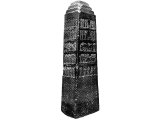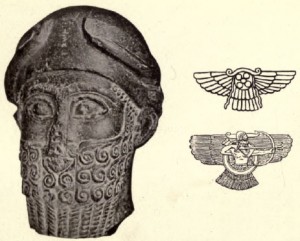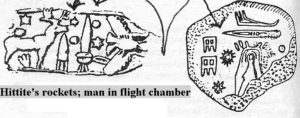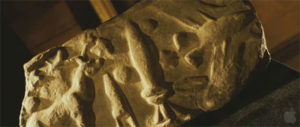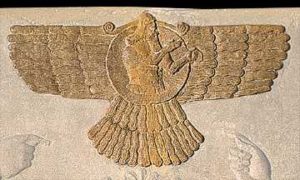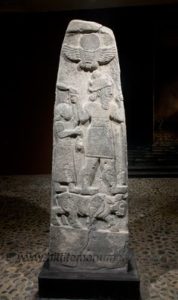Library collection: “World’s Greatest Literature”
Published work: “Babylonian and Assyrian Literature”
Translator: Rev. A. H. Sayce, M.A.
Publisher: P. F. Collier & Son, New York
(Texts: All Artifacts, Color Coding, & Writings in Bold Type With Italics Inside Parenthesis, are Added by Editor R. Brown, not the Authors, Translators, or Publishers!)
(gods in blue)
Face A, Top
I. Assur (Orien / Osiris), the great lord, the king of all
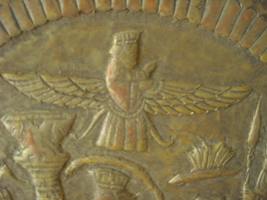 (Anu in his winged sky-disc, king on planet Nibiru & over the giant aliens on Earth)
(Anu in his winged sky-disc, king on planet Nibiru & over the giant aliens on Earth)
2. the great gods; Anu the king of the Igigi (space truckers)
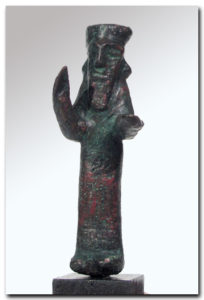
 (Bel / Enlil, King Anu‘s son & heir, Anu‘s Earth Colony Commander)
(Bel / Enlil, King Anu‘s son & heir, Anu‘s Earth Colony Commander)
3. and the Anunnaki; 1 the lord of the world, the supreme, Bel (Enlil)
4. the father of the gods, the creator
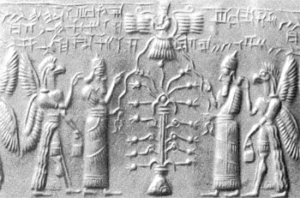 (Enki, King Anu in his winged sky-disc, Enlil, & winged minor Apkulla pilots)
(Enki, King Anu in his winged sky-disc, Enlil, & winged minor Apkulla pilots)
5. of the universe; Ea (Enki), the king of the abyss (waters) who determines destinies;
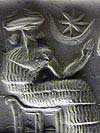
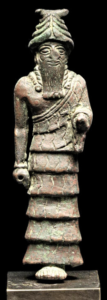 (Nannar / Sin, Enlil‘s son, Moon Crescent god of Ur; Nannar)
(Nannar / Sin, Enlil‘s son, Moon Crescent god of Ur; Nannar)
6. Sin (Nannar), the king of the (lunar) disk, who sheds the light;
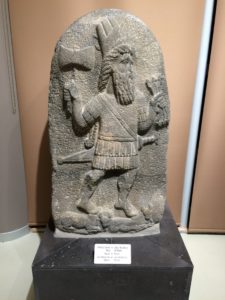
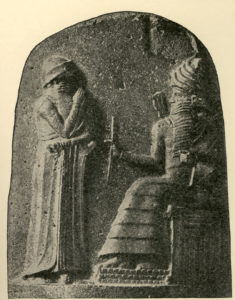 (Adad; King Hammurabi & Utu / Shamash, the Sun god)
(Adad; King Hammurabi & Utu / Shamash, the Sun god)
7. Adad (Ishkur), 2 the very mighty, the master of abundance; Shamash (Utu),
8. the judge of heaven and earth, the ordainer of all things;
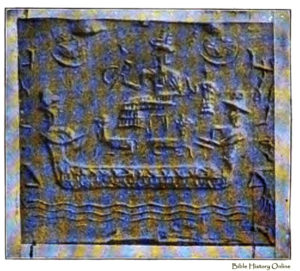 (giant alien god Marduk, patron god of Babylon, son to Enki)
(giant alien god Marduk, patron god of Babylon, son to Enki)
9. Merodach (Marduk), the herald of the gods, the master of the laws; Adar, 3 the captain
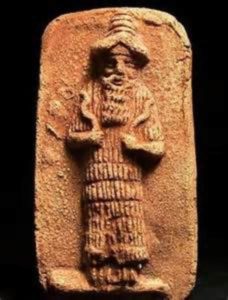
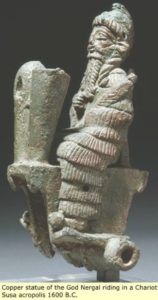 (Nergal; Nergal in his sky-chariot / sky-disc, lord of the Under World, spouse to Ereshkigal)
(Nergal; Nergal in his sky-chariot / sky-disc, lord of the Under World, spouse to Ereshkigal)
10. of the Igigi (space truckers on mars) and the Anunnaki, the god all-powerful; Nergal,
11. the valiant, the king of battles; Nusku (Enlil‘s son) who bears the august scepter,
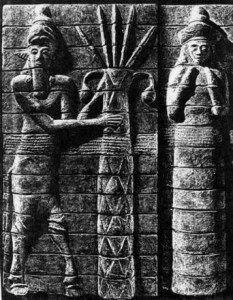 (Enlil & equal spouse Ninlil images carved into ancient city wall)
(Enlil & equal spouse Ninlil images carved into ancient city wall)
12. the omniscient god; Beltis (Ninlil), the wife of Bel (Enlil), the mother of the great gods;
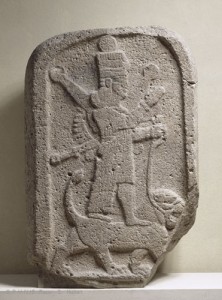 (Inanna, daughter to Nannar, powerful Goddess of Love & War, upon her Zodiac symbol Leo)
(Inanna, daughter to Nannar, powerful Goddess of Love & War, upon her Zodiac symbol Leo)
13. Ishtar (Inanna), the princess of heaven and earth, accomplished in courageous decisions;
14. the great gods who have determined my destinies and enlarged my royalty!
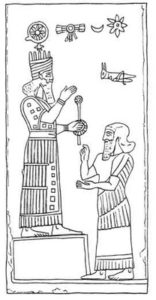 (alien giant Ashur with his king, attentively receiving his instructions directly from god)
(alien giant Ashur with his king, attentively receiving his instructions directly from god)
15. Shalmaneser (II), the king of the multitude of men, high-priest of Assur, the powerful king,
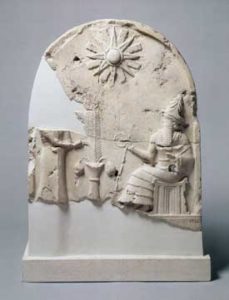 (damaged semi-divine Babylonian king stands before the “Sun-god” Utu, Nannar‘s son, Inanna‘s twin)
(damaged semi-divine Babylonian king stands before the “Sun-god” Utu, Nannar‘s son, Inanna‘s twin)
16. the king of all the four regions, the Sun-god (Utu) of the multitude of mankind, who governs
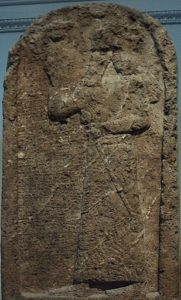 (giant mixed-breed King Ashurnatsirpal I pointing at symbols of the gods)
(giant mixed-breed King Ashurnatsirpal I pointing at symbols of the gods)
17. in all countries; the son of Assur-natsir-pal, the supreme priest, (& king) whose priesthood unto the gods
18. was pleasing, and who has subdued unto his feet all lands;
Face B, Top
19. the illustrious offspring of Tukulti-Adar 1
20. who subjugated all his enemies and
21. swept them like the tempest.—
22. At the beginning of my reign, when on the throne
23. of the kingdom I had seated myself in state, my chariots
24. (and) my armies I assembled. Into the defiles of the land of Simesi2
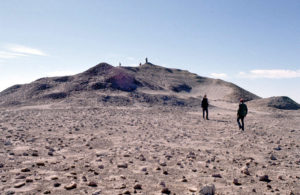
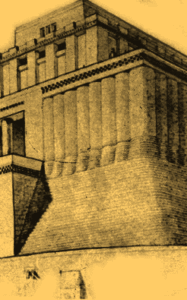 (Enki‘s patron city Eridu; & his ziggurat temple residence)
(Enki‘s patron city Eridu; & his ziggurat temple residence)
25. I penetrated. Aridu (Eridu, Enki‘s patron city), the strong city
26. of Ninni (Ninki?) I captured.—In the first year of my reign
27. I crossed the Euphrates in its flood; towards the sea of the setting sun
28. I marched. I purified my weapons in the sea. Victims
29. to my gods I sacrificed. I ascended mount Amanus; 3
30. I cut logs of cedar and thuya.
31. I climbed mount Lallar and erected there an image of my royalty.—
32. In the second year of my reign I approached the city of Til-Barsaip. 4 The cities
33. of Akhuni the son of Adini I captured; I shut him up in his city. 5 The Euphrates
34. I crossed in its flood. Dabigu, a fortress of the land of the Hittites, 6
35. together with the cities that were dependent upon it I captured.—In the third year of my reign Akhuni
36. the son of Adini trembled before my powerful arms, and Til-Barsaip,
Face C, Top
37. his royal city, he abandoned, and he crossed the Euphrates.
38. The City of Ana-Assur-utir-atsbat, 1 situated on the further side
39. of the Euphrates, upon the river Sagurra, 2 which the people
40. of the land of the Hittites call Pitru, 3
41. I took for myself. On my return
42. I penetrated into the defiles of the country of Alzi. 4 The countries of Alzi, Lukh[me],
43. Dayeni (and) Numme, the City of Arzashkun the capital
44. of Arame of the country of Urardhu, 5 the countries of Guzan (and) Khupushkia [I have conquered].
45. In the eponymy of Dayan-Assur 6 I departed from Nineveh; the Euphrates
46. I crossed at its flood. I marched against Akhuni the son of Adini; the country of Shitamrat, 7
47. a mountain peak on the bank of the Euphrates, he made his stronghold. The peak
48. of the mountain I assaulted and captured. Akhuni with his gods, his chariots,
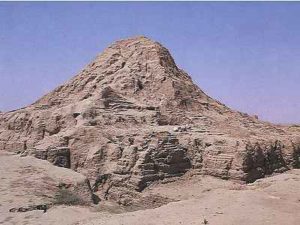 (Ashur‘s ziggurat temple residence in his patron city of Assur, city found way below)
(Ashur‘s ziggurat temple residence in his patron city of Assur, city found way below)
49. his horses, his sons, his daughters, (and) his army I carried away and to my city of Assur (Ashur‘s patron city)
50. I brought. In that same year I crossed mount Kullar; to the country of Zamua
51. of Bitani 8 I descended. The cities of Nikdiara the prince of the Idians
52. (and) of Nikdima I captured.—In the fifth year of my reign I ascended mount Kashyari. 1 Eleven strong cities
53. I captured. I besieged Ankhitti 2 of the country of the Rurians in his city. His tribute
54. abundant I received.—In the sixth year of my reign to the cities on the banks of the Balikhi 3
Face D, Top
55. I approached. They had slain Giammu their governor.
56. I entered the city of Til-Turakhe. 4
57. I crossed the Euphrates at its flood.
58. The tribute of the kings of the country of the Hittites
59. all of them I received. Then Dadda-Idri 5
60. the king of the country of Emerishu, 6 Irkhulina 7 of the country of the Hamathites, together with the kings
61. of the country of the Hittites and of the coast of the Sea, to their allied forces
62. trusted, and to offer combat and battle
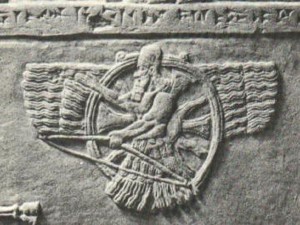 (Marduk‘s son Ashur in his winged sky-disc, instructing his king to continue on)
(Marduk‘s son Ashur in his winged sky-disc, instructing his king to continue on)
63. came against me. By the command of Assur (Ashur) the great lord, my lord,
64. I fought with them, I defeated them.
65. I took from them their chariots, their litters (?) (and) their war material.
66. I slew 20,500 of their soldiers with weapons.—
67. In the 7th year of my reign I marched against the cities of Khabini (prince) of Til-Abnê.
68. I captured Til-Abnê his stronghold and the cities dependent on it.
69. I marched to the sources of the Tigris, the place from whence the waters gush forth;
70. there I purified the arms of Assur (alien advanced weaponry); I sacrificed victims to my gods; a feast of rejoicing
71. I made. I erected a great image of my royal majesty. The glory of Assur my lord, the exploits
72. of my valor, and all that I had done in these countries, I inscribed upon it; I set (it) up there.—
Face A, Base
73. In the 8th year of my reign (against) Merodach-shum-iddin the king of the country of Karduniash 1
74. Merodach-bel-usate his younger brother revolted. (The country)
75. they divided between them. To avenge
76. Merodach-shum-iddin I marched. I captured the city of Me-Turnat. 2—
77. In the 9th year of my reign for the second time I marched to the country of Accad (Akkad). 3
I besieged Gananate. As for Merodach-bel-usate, the terror

 (Ashur; father Marduk, used alien weaponry insuring victories for their mixed-breed kings)
(Ashur; father Marduk, used alien weaponry insuring victories for their mixed-breed kings)
79. of the glory of Assur (and) Merodach overwhelmed him, and to save his life
80. he ascended the mountain. I marched after him. Merodach-bel-usate (and) the soldiers,
81. the rebel-chiefs who were with him I slew with my weapons. To the great cities
82. I marched; I offered sacrifices in Babylon (Marduk‘s city), Borsippa (Nabu‘s city) and Kuta. 4
83. I made offerings to the great gods. I descended to the country of Chaldæa; 1 I captured their cities.
84. I received the tribute of the kings of the country of Chaldæa. The torrent (?) of my arms overwhelmed as far as the Salt-marshes. 2—
85. In the 10th year of my reign for the eighth time I crossed the Euphrates; I captured the cities of Sangara of Carchemish; 3
86. I approached the cities of Arame. I captured Arnê. his royal city and 100 of his towns.—
87. In the 11th year of my reign for the ninth time I crossed the Euphrates. I captured cities without number. To the cities of the land of the Hittites
88. (and) of the country of the Hamathites I descended. I captured 89 towns. Dadda-idri of the country of Damascus (and) twelve kings of the country of the Hittites 4
89. ranged themselves side by side; I overthrew them.—In the 12th year of my reign for the tenth time I crossed the Euphrates.
90. I marched against the country of Paqarkhubuna; I carried away their spoil.— In the 13th year of my reign I went up against the country of Yaeti;
91. I carried away their spoil.—In the 14th year of my reign I assembled (the men) of the country; I crossed the Euphrates; twelve kings met me;
92. I fought [with them]; I overthrew them.—In the 15th year of my reign I marched to the sources of the Tigris (and) Euphrates. An image
93. I erected in their caverns.—In the 16th year of my reign I crossed the Zab; 5 to the country of Namri 6
94. I marched. Merodach-mudammiq king of Namri, to save his life, ascended (the mountain): his goods,
95. his troops (and) his gods I transported to Assyria. Yanzu 1 the son of Khanban I raised to the sovereignty over them.—
Face B, Base
96. In the 17th year of my reign I crossed the Euphrates; I ascended mount Amanus; logs
97. of cedar I cut.—In the 18th year of my reign for the sixteenth time I crossed the Euphrates. Hazael
98. of the country of Damascus advanced to battle: 1121 chariots, 470 litters (?) with
99. his camp I took from him. 2—In the 19th year of my reign for the eighteenth time I crossed the Euphrates. Mount Amanus
100. I ascended: logs of cedar I cut.—In the 20th year of my reign, for the twentieth time, the Euphrates
101. I crossed. Into the country of Qaue 3 I descended. I captured their cities. Their spoil
102. I carried away.—In the 21st year of my reign for the21st time I crossed the Euphrates. Against the cities
103. of Hazael of the country of Damascus I marched; four of his cities I captured. The tribute of the Tyrians,
104. the Sidonians (and) the Gebalites 1 I received.—In the 22d year of my reign for the 22d time the Euphrates
105. I crossed. I descended into the country of Tubal. 2 At that time from the twenty-four
106. kings of Tubal I received gifts. To mount Tumar,
107. a mountain of silver, a mountain of mulî, 3 a mountain of marble, I marched. —In the 23d year of my reign
108. the Euphrates I crossed. Uetash the stronghold
109. of Lalla the Milidian 4 I captured. The kings of Tubal
110. had come; their tribute I received.—In the 24th year of my reign the Lower Zab
111. I crossed. I passed over mount Khashimur; into the country of Namri
112. I descended. Yanzû the king of Namri before
113. my powerful (advanced alien) weapons trembled, and to save his life
114. ascended (the mountain). Sikhishalakh, Bit-Tamul, Bit-Sakki
115. (and) Bit-Shêdi his strong cities I captured. His soldiers I slew.
116. His spoil I carried away. I threw down, dug up (and) burned with fire the cities.
117. The survivors of them ascended the mountains. The mountain peaks
118. I assaulted, I captured: their soldiers I slew; their spoil (and) their goods
119. I carried down. I departed from the country of Namri. The tribute of twenty- seven kings
120. of the country of Parsua 1 I received. From Parsua I departed. Into
121. the country of Messi, the country of the Amadians, 2 the country of Araziash (and) the country of Kharkhar I descended.
Face C, Base
122. The cities of Kuakinda, Khatstsanabi, 3 Esamul
123. (and) Kinablila as well as the towns dependent on them I captured. Their soldiers
124. I slew, their spoil I carried away. The cities I threw down, dug up (and) burned with fire. An image of my majesty
125. in the country of Kharkhâra I set up. Yanzû the son of Khaban, with his numerous goods,
126. his gods, his sons, his daughters (and) his many troops I carried away, to Assyria I brought (them).—In the 25th year of my reign
127. the Euphrates at its flood I crossed. I received the tribute of all the kings of the country of the Hittites. Mount Amanus
128. I passed over. I descended into the cities of Katê of the country of the Qauians. Timur his stronghold
129. I assaulted, I captured. I slew their soldiers. I carried away their spoil. The cities to a countless number I threw down, dug up
130. (and) burned with fire. On my return Mûru the stronghold of Arame the son of Agusi
131. I took for myself as a fortress. 4 I surrounded its enclosure (with a wall); I founded therein a palace as my royal abode.—
132. In the 26th year of my reign for the 7th time I passed over Mount Amanus; for the 4th time against the cities of Katê
133. of the country of the Qauians I marched. I besieged Tanakun 1 the stronghold of Tulka. The terror
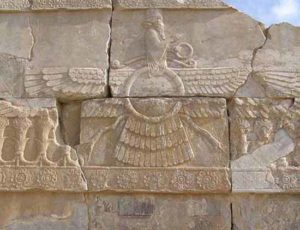 (Ashur overwhelms earthlings using alien advanced weaponry)
(Ashur overwhelms earthlings using alien advanced weaponry)
134. of the glory of Assur my lord overwhelmed him and they came forth, they took my feet. I took hostages from him. Silver, gold,
135. iron, oxen (and) sheep I received from him as his tribute. I departed from Tanakun; against the country of Lamena
136. I marched. The inhabitants fled; they occupied an inaccessible mountain; the summit of the mountain I assaulted,
137. I captured. Their soldiers I slew; their spoil, their oxen (and) their sheep I brought down from the mountain.
138. I threw down, dug up (and) burned with fire their cities. Against the city of Tarzi 2 I marched. They took my feet. Silver (and) gold,
139. I received as their tribute. Kirrî the brother of Katê to the sovereignty over them
140. I appointed. On my return I ascended over mount Amanus. Logs of cedar I cut,
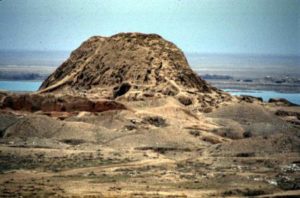 (city of Assur with Ashur‘s mud brick-built ziggurat-house way above)
(city of Assur with Ashur‘s mud brick-built ziggurat-house way above)
141. I removed, to my city of Assur I transported.—In the 27th year of my reign I assembled my chariots (and) my armies. Dayân-Assur
142. the Tartan, 3 the commander of my numerous armies, at the head of my troops against the country of Ararat I despatched,
143. I sent. Into the country of Bit-Zamani 4 he descended; into the defiles of the city of Ammash he entered; the river Arzania 5 he crossed.
144. Seduri 1 of the country of the Araratians heard and to the strength of his numerous armies
145. trusted; he came against 2 me to make combat (and) battle. I 2 fought with him,
146. I defeated him; I filled the wide plain with the bodies of his warriors.—In the 28th year of my reign,
147. while I was staying in Calah, news was brought to me (that) the men of the country of the Patinians 3
148. had slain Lubarni their prince (and) had raised to the sovereignty over them Surri who had no right to the throne.
149. Dayan-Assur the Tartan, the commander of my numerous armies, at the head of my army (and) my train
150. I dispatched, I sent. He crossed the Euphrates at its flood. In Kinalua, 4 the royal city of (Surri),
151. he made a massacre. As for Surri the usurper, the terror of the glory of Assur my lord
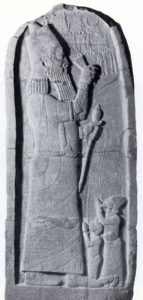 (giant alien god Ashur, & scared, overpowered, non-capable earthlings in perfect attention & amazement)
(giant alien god Ashur, & scared, overpowered, non-capable earthlings in perfect attention & amazement)
152. overwhelmed him and he died a natural death. The men of the country of the Patinians before the splendour of my powerful weapons (alien high-tech weaponry)
Face D, Base
153. trembled, and they seized the sons of Surri and the leaders in the rebellion (and) delivered (them) to me.
154. I hung these men on gibbets. Sasi a son of the country of Utstsâ took my feet; to the sovereignty
155. over them I appointed (him). I received from them silver, gold, lead, copper, iron, (and) ivory to a countless amount.
156. I made a very lofty image of my majesty; I placed (it) in Kinalua his royal city in the house of his gods.—In the 29th
157. year of my reign my armies (and) train I dispatched, I sent. I ascended to the country of Kirkhi. 1 Their cities I threw down,
158. dug up (and) burned with fire. Their country I swept like the tempest. The terror
159. of my glory I poured over them.—In the 30th year of my reign, while I was staying in Calah, Dayan-Assur
160. the Tartan, the commander of my numerous armies, I dispatched, I sent at the head of my armies. The Zab
161. he crossed, he made his way to the cities of Khubushkâ. 2 The tribute of Datana
162. the Khubushkian I received. From the cities of the Khubushkian
163. I departed. He 3 approached the cities of Makdubi 4 the Malkhisian. Tribute
164. I received. He 3 departed from the cities of the Malkhisians. To the cities of Ualki
(ancient battle scene of rocket launches & sky-ships manned by alien gods)
165. the Mannian 5 he approached. Ualki the Mannian before the splendour of my puissant weapons
166. trembled, and quitted Zirta his royal city, and to save his life ascended (the mountains).
167. I pursued after him; I brought back his oxen, his sheep (and) his goods to a countless number. His cities
168. I threw down, dug up (and) burned with fire. He 1 departed from the country of the Mannâ; to the cities of Shulusunu of the country of Kharru
169. he approached. He captured Masashuru his royal city as well as the cities dependent on it. To Shulusunu
170. and his sons I granted pardon. I restored him to his country. Gifts (and) tribute, horses trained
171. to the yoke I imposed upon him. He approached Shurdira. The tribute of Artasari
172. the Shurdirian I received. Into the country of Parsu 2 I descended. The tribute of the kings
173. of the country of Parsua I received. As for the rest of the country of Parsua (which was) not obedient to Assur, their cities
174. I captured, their spoil (and) their goods I carried away to Assyria.—In the 31st year of my reign, for the second time, the face
(Ashur in his winged sky-disc; Anu‘s daughter Shala & spouse Hadad / Adad, with winged sky-disc above)
175. I fixed (?) on Assur (Ashur) (and) Hadad (Adad). 3 At that time, while I was staying in Calah, Dayan-Assur
176. the Tartan, the commander of my numerous armies, at the head of my armies (and) my train I dispatched, I sent.
177. The cities of Datâ 4 the Khubushkian he approached. Tribute I received.
178. Against the city of Tsapparia the stronghold of the country of Mutsatsira 5 I marched. The city of Tsapparia together with
179. 46 cities of the Mutsatsirians he captured. As far as the fortresses of the people of Ararat
180. I marched. I threw down, dug up (and) burned with fire their cities. Into the country of Guzan 1 I descended. The tribute
181. of Ubû the Guzanian, of the Mannians, the … Burisians, the Kharranians, 2
182. the Shashganians, the Andians (and) the A … rians, oxen, sheep, and horses
183. trained to the yoke I received. I descended into the cities of the country of …; the cities of Perria
184. (and) Shitiuarya 3 his cities, with twenty-two towns dependent on it, I threw down, dug up
185. (and) burned with fire. I spread over them the terror of my glory. He marched against the cities of the Parsuans.
186. The cities of Bushtu, 4 Shala-Khamanu, (and) Kinikhamanu, strongholds, together with 22 cities
187. which (were) dependent on them I captured. I slew their fighting men, I carried away their spoil. Into the country of Namri I descended.
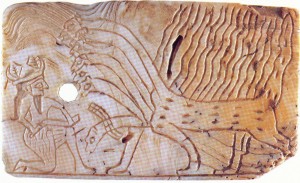 (Ashur & father Marduk symbolized as a multi-headed beast)
(Ashur & father Marduk symbolized as a multi-headed beast)
188. The terror of the glory (alien technologies) of Assur (and) Merodach (Marduk) overwhelmed them; they abandoned their cities, to
189. inaccessible mountains they ascended. I threw down, dug up (and burned with fire 250 of their cities.
190. I descended through the pass of Simesi, the key 5 of the country of Khalman.
THE EPITAPHS OVER THE BAS-RELIEFS
I
I have received the tribute of Sûa of the country of Guzan: silver, gold, lead, vases of copper, scepters for the hand of the king, horses, (and) dromedaries with two humps.
II
I have received the tribute of Jehu, the son of Omri: 1 silver, gold, bowls of gold, chalices of gold, cups of gold, pails of gold, lead, scepters for the hand of the king, (and) spear-shafts.
III
I have received the tribute of the country of Mutsri: 2 dromedaries with two humps, an ox of the river Sakeya (?) an antelope, elephants, 3 (and) apes with their young (?)
IV
I have received the tribute of Merodach-abil-utsur of the country of the Shuhites: 4 silver, gold, pails of gold, ivory, spear-shafts, bûya, embroidered vestments, (and) linen.
V
I have received the tribute of Garparunda of the country of the Patinians: silver, gold, lead, copper, vases of copper, ivory, (and) boxwood.”
Footnotes
38:1 That is to say, of the spirits of heaven and earth.
38:2 [Ramman, Rimmon (Adad),—Ed.]
39:1 Tiglath-Uras (mixed-breed demigod son made king).
39:2 [For the situation of ’Sime’si, see note on line 190.—Ed.]
39:4 [Probably the Barsampsê of Ptolemy, though Delitzsch identifies it with Birejik.]
39:6 [Or “the city Dabigu (and) the city Birtu of the land of the Hittites” (Khatti).—Ed.]
40:1 [”For Assur (Marduk‘s son) I have taken (it) again”; the name given by Shalmaneser (mixed-breed bloodline descendant made king) to Pethor.—Ed.]
40:3 [The Pethor of the Old Testament, to which Balaam belonged.—Ed.
40:4 For Alzi, at the sources of the Sebbeneh Su, see Records of the Past, new series, i. p. 94, note 4.
40:6 [B.C. 854. This was at the beginning of the fifth year of the king’s reign.—Ed.]
40:7 [Or Siparrat.—Ed.]
40:8 [In Armenia, on the southern shores of Lake Van, so called to distinguish it from another Zamua in Kurdistan between Sulamaniyeh and p. 41 the Shirwan. The Lake of Van is called “the sea of Zamua of Bitani.” The Armenian Zamua is also termed Mazamua. Bitâni in Assyrian signified “palace,” but when applied to Armenia it seems to be intended for an incorrect representation of the native name Biaina(s) or Van.—Ed.]
41:2 [Or perhaps, Ilu-Khitti, see Records of the Past, new series, ii. p. 148, note 2.—Ed.]
41:3 [The modern Belikh, which flows into the Euphrates north of the Khabour.—Ed.]
41:4 [Perhaps Tiele is right in reading Til-Balakhe, “the mound of Belikh. “—Ed.]
41:5 [Hadad-ezer, which in Aramaic would be Hadad-eder. He is the Ben-hadad of the Old Testament, Ben-Hadad “the (mixed-breed demigod) son of Hadad (Adad),” being, as we learn from the cuneiform inscriptions, the name or title of one of the Syrian gods.—Ed.]
41:6 [The Assyrian name of the kingdom of Damascus, possibly connected with the word Amorite.—Ed.]
41:7 [“The moon is our god (Nannar).”—Ed.]
42:1 Babylonia.
42:2 “The waters of the Turnat” or Tornadotus, the modern Dijâlah, which falls into the Tigris a little below Bagdad. With the name of the city compare that of the capital of Ammon, 2 Sam. xii. 27.
42:3 Northern Babylonia.
42:4 Now Tell-Ibrahim, east of Babylon.
43:1 Kaldi, in the marshes at the head of the Persian Gulf.
43:2 Literally “the bitter (river),” Marrati: cf. the Merathaim of Jer. l. 21.
43:3 [Gargamis, now Jerablûs, on the western bank of the Euphrates, a little to the north of the Sajur.—Ed.]
43:4 [The name is here extended so as to include Syria, Palestine, and even northern Arabia.—Ed.]
43:5 [Here written Me-Zaba, “the water of the (Lower) Zab.”—Ed.]
43:6 [In the Kurdish mountains north of Holwân.—Ed.]
44:1 [In the Kassite language, spoken in the district adjoining Namri, yanzi signified “king.”—Ed.]
44:2 [The following fragment (W. A. I., iii. 5, No. 6) gives an account of this campaign in further detail:—”In the 18th year of my reign for the 16th time I crossed the Euphrates. Hazael of Damascus trusted to the strength of his armies and assembled his armies to a large number. Saniru (the Biblical Shenir, Deut. iii. 9), a mountain summit as you come to Lebanon, he made his stronghold. I fought with him, I defeated him: 6000 of his soldiers I slew with weapons, 1121 of his chariots, 470 of his war-horses along with his camp I took from him. To save his life he ascended (the mountain). I pursued after him. In Damascus his royal city I shut him up. His plantations I cut down. As far as the mountains of the Hauran I marched. The cities to a countless number I threw down, dug up (and) burned with fire. Their spoil to a countless amount I carried away. As far as the mountain of Bahli-rahsi (Baal-rosh at the mouth of the Dog River), which (is) a headland of the sea, I marched: an image of my majesty I set up upon it. At that time I received the tribute of the Tyrians, the Sidonians (and) of Yahua (Jehu) the son of Khumrî (Omri).”—Ed.]
44:3 [Elsewhere written Que. They seem to have inhabited the northern shore of the Gulf of Antioch. Lenormant has suggested that the name occurs in 1 Kings x. 28, where the word translated “linen yarn” ought to be rendered “from Queh. “—Ed.]
45:1 See Josh. xiii. 5; 1 Kings v. 32; Ez. xxvii. 9. Gebal was the classical Byblos, eight miles north of Beyrout.
45:2 [Tabali, the Tibareni of classical geography. In the Assyrian period they lived between the Muskâ or Meshech and Komagênê, to the east of Malatiyeh.—Ed.]
45:4 Milid is represented by the modern Malatiyeh.
46:1 [Also called Par´suas; in the Vannic inscriptions Bar´suas. It lay to the south-east of the Mannâ or Minni on the south-western shore of Lake Urumiyeh.—Ed.]
46:2 [Amadâ, probably to be identified with Madâ or “Medes.” If so, this is the earliest mention we have of the latter people.—Ed.]
47:1 [Compare the name of Thanakê given by Apollodoros (iii. 14, 3, I) as the wife of Sandakos, who came from Syria to Kilikia and there founded Kelenderis; she was the mother of Kinyras and the daughter of king Megessaros.—Ed.]
47:3 [Turtannu or “commander-in-chief.” See Is. xx. 1; 2 Kings xviii. 17.—Ed.]
47:4 [Literally “the house of the country of Zamani.”—Ed.]
47:5 [The Arsanias of classical geography, which joins the Euphrates near Mush to the west of Lake Van.—Ed.]
48:1 [Sarduris I., of the native Vannic texts, of whom we have two inscriptions in the Assyrian language, both found at Van. He introduced the cuneiform system of writing into Armenia, and seems to have founded the Vannic kingdom. In his inscriptions he calls himself the son of Lutipris and king of Nairi, and claims to have built the citadel of Van. His son and successor, Isbuinis, substituted the native language for Assyrian in his inscriptions. See my Memoir on the Cuneiform Inscriptions of Van, Jrl. R. A. S., xiv. 3, 4; xx. 1.—Ed.]
48:2 Shalmaneser here identifies himself with his commander-in-chief.
48:3 [The Patinâ inhabited the district between the eastern bank of the Afrin and the Gulf of Antioch, extending southward to the Orontes.—Ed.]
48:4 [Also called Kunulua and Kinalia, between the Afrin and the Orontes, perhaps the classical Gindarus.—Ed.]
49:1 [Probably the same as Qurkhi “opposite the land of the Hittites.” See Records of the Past, new series, ii. p. 540, note 4.—Ed.]
49:2 [Khubuska, also called Khubuskia, lay on the north-eastern frontier of Assyria, between the Zab and the territory of the Minni.—Ed.]
49:3 That is to say Dayan-Assur.
49:5 [The Mannâ, called the Manâ in the Vannic inscriptions, are the Minni of Old Testament (Jer. l. 27), who inhabited the country on the eastern border of the kingdom of Ararat or Van, and extended along the western shore of Lake Urumiyeh.—Ed.]
50:1 That is to say Dayan-Assur.
50:2 See p. 46, note 1, above.
50:4 Called Datana above, line 161.
50:5 [Mutsatsira lay on the southern border of the kingdom of Ararat or Van, and was destroyed by Sargon in B.C. 714. The cylinder of its last king Urzana is now in the Museum of the Hague. See my Memoir on the Vannic Inscriptions, p. 693.—Ed.]
51:1 [This northern Guzan or Gozan was different from the Gozan near Diarbekir, at the sources of the Khabour, to which the Israelites were transported according to 2 Kings xviii. 11. See Epigraph I.—Ed.]
51:2 [Not to be confounded with the famous city of Kharran or Haran in Mesopotamia, mentioned in Genesis.—Ed.]
51:3 [Called Satiraraus in the Vannic Inscriptions.—Ed.]
51:4 [Called the country of Bustus in the Vannic inscriptions, from which we learn that it lay to the south-east of the Mannâ. It would have occupied the southern shore of Lake Urumiyeh.—Ed.]
51:5 [Literally “at the head.” Khalman, or rather Khalvan, is the modern Holwan. It was here, at Sir-Pul, that Sir H. Rawlinson discovered the cuneiform inscription of Kannubanini king of the Lulubini.—Ed.]
52:1 “Yahua the son of Khumrî.” This was in B.C. 842. Shalmaneser was misinformed in regard to the relationship of Jehu to the dynasty of Omri. Samaria, however, was known to the Assyrians as “the House of Omri,” in consequence of their first becoming acquainted with it in the reign of Ahab.
52:2 Mutsri lay to the north-east of Khorsabad on the caravan route from the east. See Records of the Past, new series, i. p. 109, note 7.
52:3 [Rather “female elephants.” Perhaps the next word baziati is an adjective in agreement. The “ox” would be either a yak or a rhinoceros according to the bas-relief.—Ed.]
52:4 [Sukhâ. The Shuhites extended along the western bank of the Euphrates from the Khabour to the Belikh. Cf. Job ii. 11.—Ed.]
